DENISE ARNOLD
The Cambodia Charitable Trust exists because an ordinary lawyer and mother from Tauranga felt compelled to do something to combat the horrors of child sex trafficking in Cambodia.
From childhood, Denise Arnold lived with an awareness of how lucky she was and a nagging sense that she was supposed to be doing something more with her life than living the Kiwi dream.
This is her story.
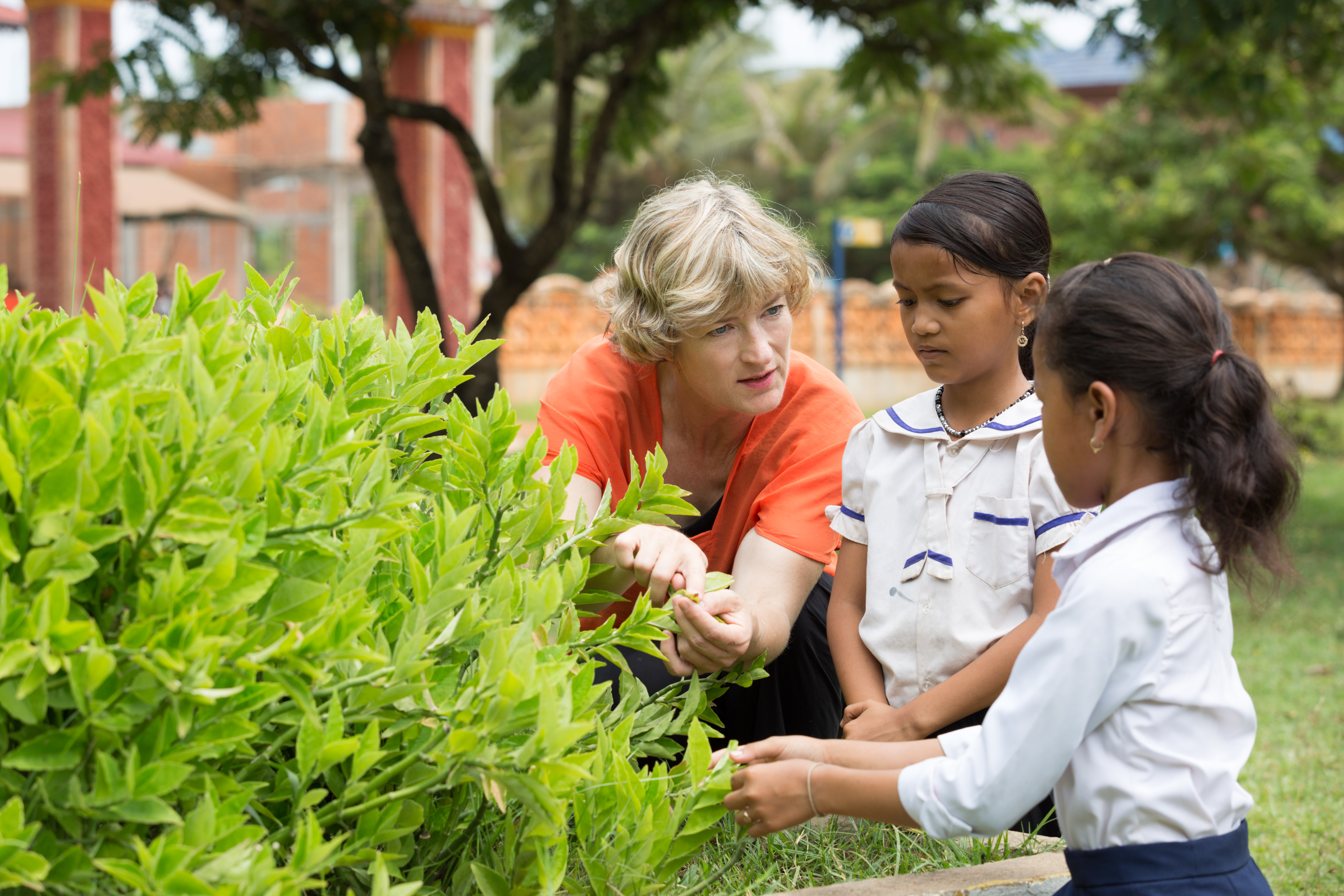
THE LUCKY ONES
I always had a sense that I was lucky. My sisters and I grew up in a loving family in Tauranga, were well provided for and given lots of opportunities. From early on I also sensed that maybe others weren’t so lucky and that I should do something about that.
I gave away my school-lunches all the time and often invited the kids that needed a bit of help back to my home after school.
I believed that we should be kind and support each other if we could. Something in me really wanted everyone to be alright.

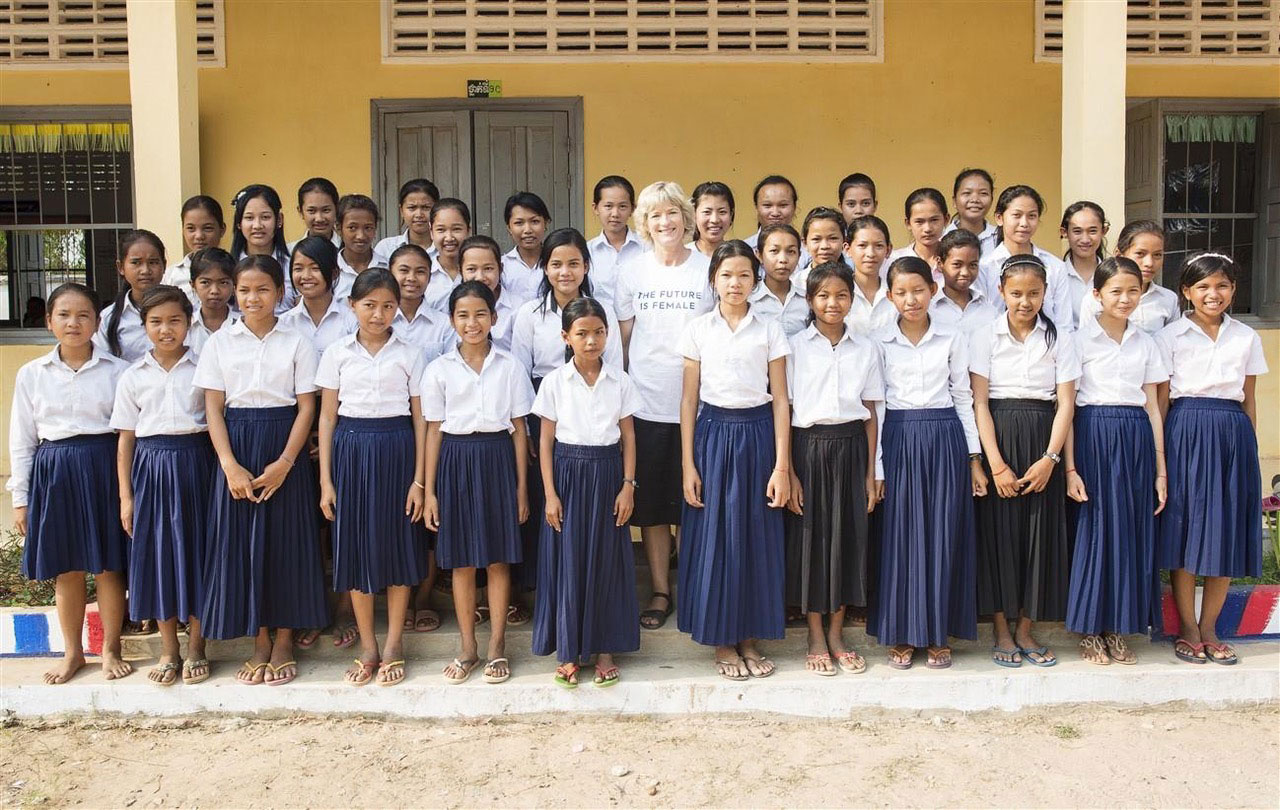
SUCCESS + DIS-SATISFACTION
 I was a bright student so I decided to study law. I arrived at Lyon O’Neale Arnold in 1988 as a new graduate full of determination and ambition. By the time I was 29, I had been appointed a partner in the firm and had two beautiful little girls. By all the standard measures, my life was successful.
I was a bright student so I decided to study law. I arrived at Lyon O’Neale Arnold in 1988 as a new graduate full of determination and ambition. By the time I was 29, I had been appointed a partner in the firm and had two beautiful little girls. By all the standard measures, my life was successful.
But, I always had a nagging sense that I was meant to be doing something more. It was like I had homework I hadn’t finished. I knew there was something I was meant to be doing to help set the world to rights and I had a sense of urgency to find out what that was. It wasn’t guilt; I felt compelled by some interior force.
THE TURNING POINT
One evening, at the end of a long day at work, I was reading the newspaper in bed. I usually avoid sad stories because the details haunt me. But on this night, there was a photo of young children in the paper and something in me felt drawn to the article. It was about child prostitution in Cambodia, describing how young children could be hired out for sex for a whole week and then returned to the brothel.
After I read the article I couldn’t sleep. I felt nauseous when I thought about those children, and the price they were paying for someone else’s depravity.
This was happening to these children now – while I was living my happy, successful life and my daughters were in school and going to birthday parties. Something changed in me from that moment.
I thought about the saying that the only thing necessary for evil to triumph is for good men to do nothing. Despite all my good intentions and my nagging sense of there being something I needed to do, I was still doing nothing.
It was time for that to change. I could no longer just be a good person in my privileged world. I needed to step out and do what I could to balance the injustice in the world and protect these children.
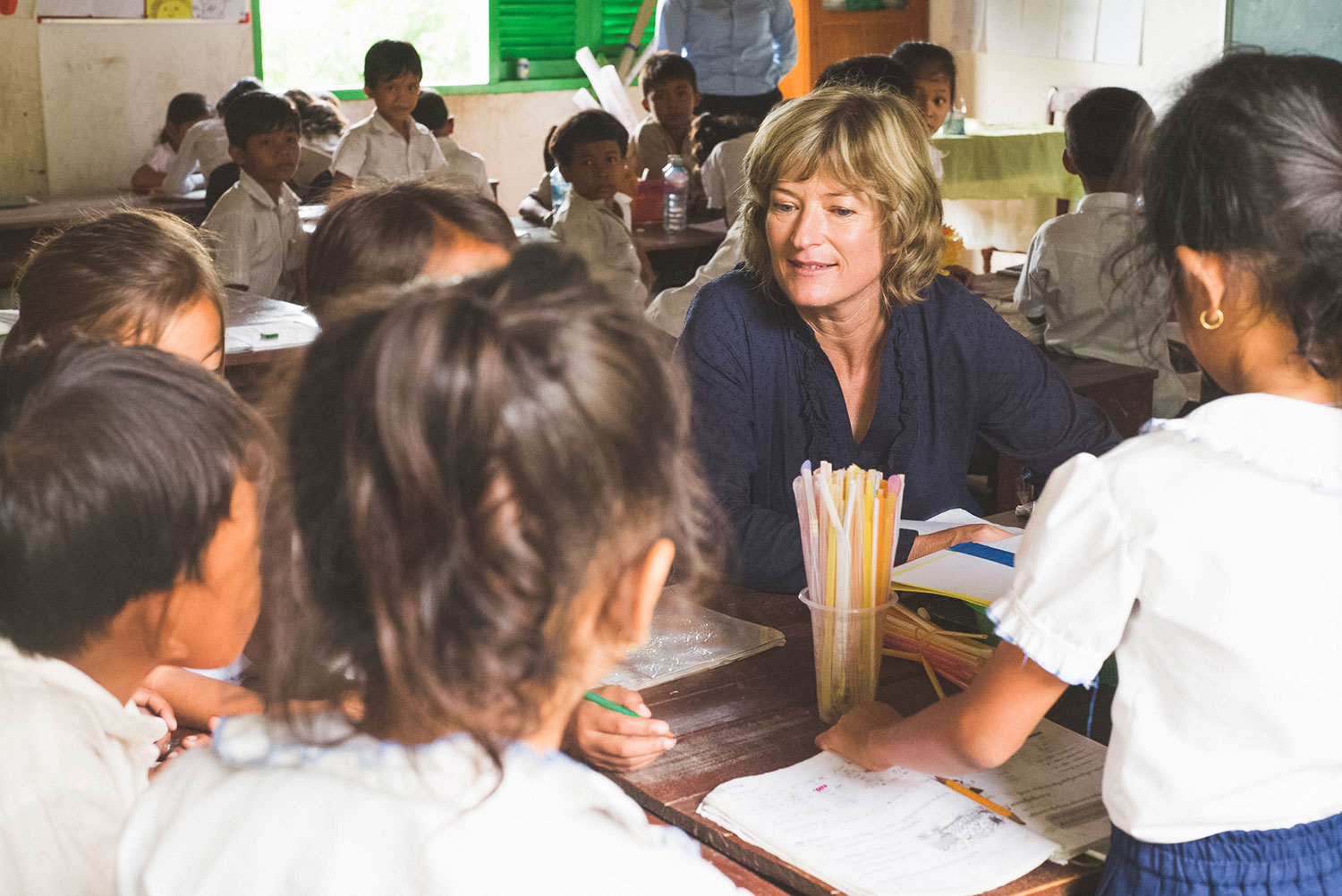
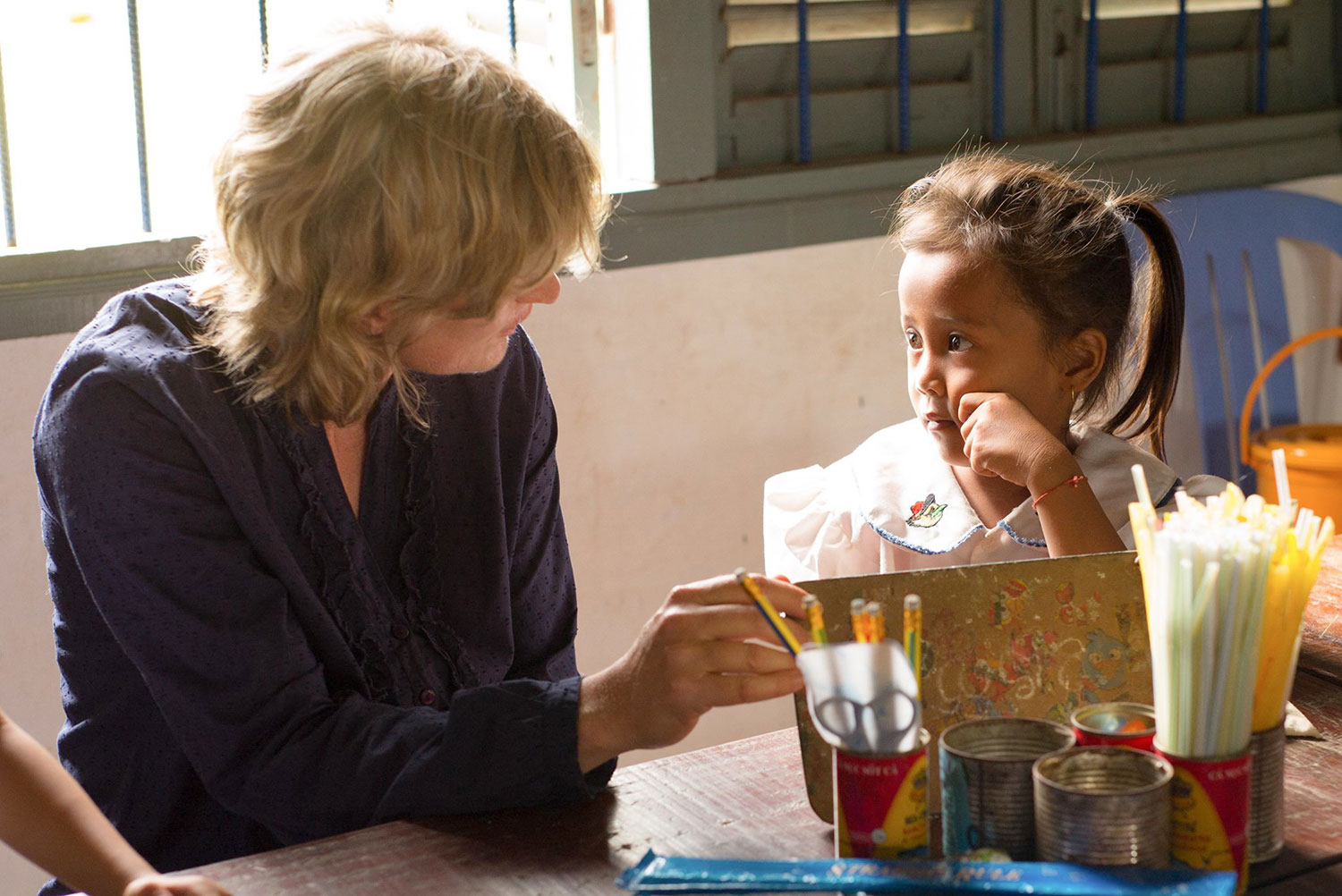
MY FIRST STEPS IN CAMBODIA
After researching Cambodia I knew I had to go there myself. I wanted to walk amongst the locals and try to get a sense of what it was like to live there.
In November 2007, I left my family behind and hopped on a plane to spend three weeks in Cambodia. I had never had an OE after university and this was my first trip to Asia. I travelled to Phnom Penh, Siem Reap, Battambang, Takeo, Kampot and Kep. I found there was much to love, and much to hate. The poverty was everywhere. My senses were accosted by beggars, children on the streets, people hawking goods no one wanted, old people sitting on the dirty streets cluttered with dogs, cats, cows, donkeys, pigs and chickens. But the people were gentle, welcoming and working hard to rebuild their lives after decades of civil war. They were inspirational.
I should have been homesick and terrified. Instead I felt like I belonged. I felt safe and energised.
WHAT CAN ONE PERSON DO?
Several things became clear to me after this trip.
I knew I couldn’t go into brothels and rescue children directly. I thought my heart would break if I got too close to the individual tragedies and then what help would I be? I had responsibilities in New Zealand – my own children, my husband, a busy law practice. I couldn’t just move to Cambodia, and I didn’t want to.
Also, if I rescued children, there were thousands more waiting to take their place. I instinctively knew that my contribution would be to tackle the issue systemically, focusing on prevention. I needed to be the fence at the top of the cliff, not the ambulance at the bottom.
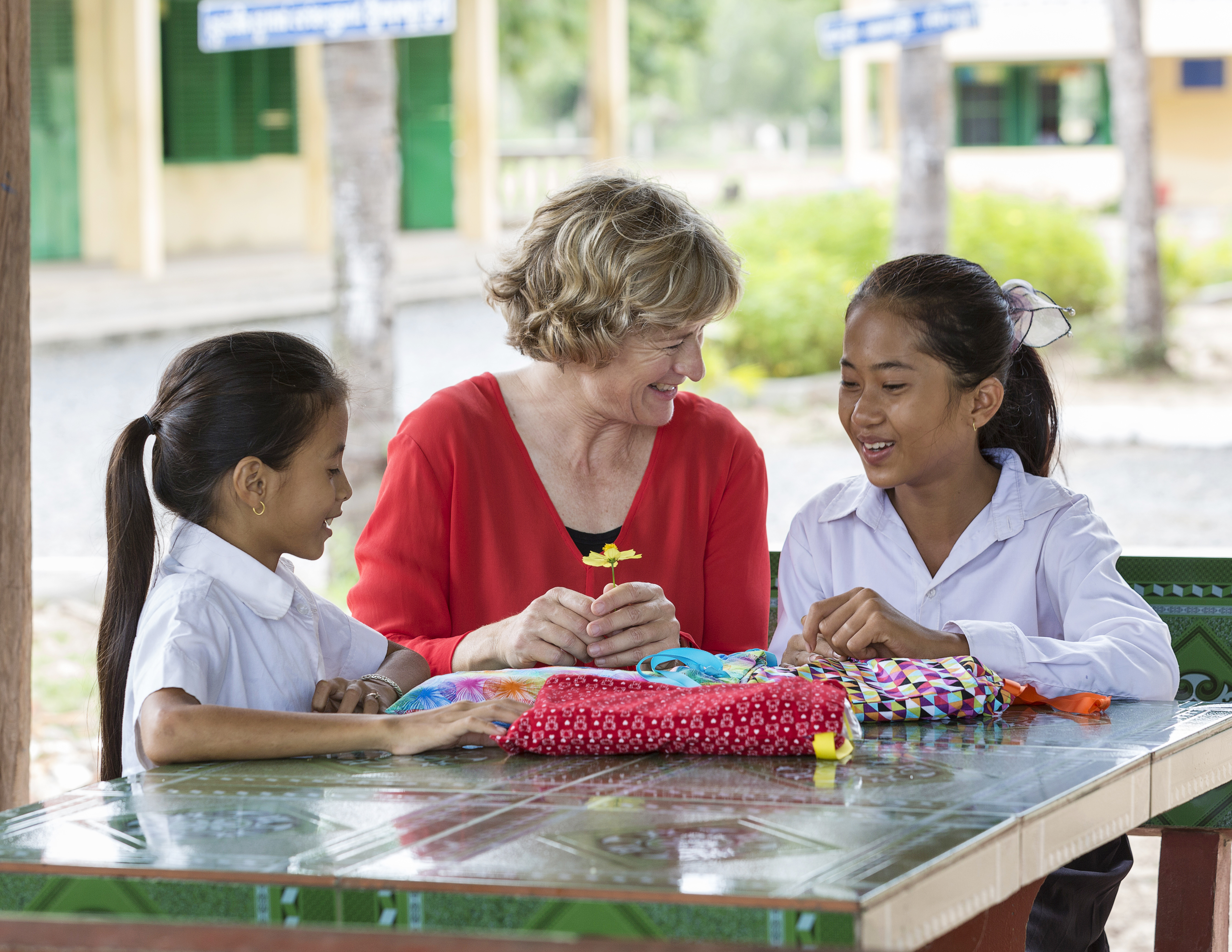

THE VIEW FROM THE TEN YEAR MARK
When I look back on the last decade, what stands out to me is that when I need help it comes. When I look for guidance I find it.
I won’t deny it has been hard work to raise the money we need, and sometimes I have stayed awake worrying about how I will keep everything going. But I still feel that this is my task. I know we are making a huge impact.
We have a very good relationship with the Cambodian Ministry of Education, Youth and Sport. We are listened to, we are partners in the development of education.
We have a reputation for achieving things far beyond what we should be able to with our resources.
The ‘shoulder effect’ of our work is huge. Schools around our supported schools are learning from us and adapting and doing better. We can clearly see that whatever we do, we will positively influence large number of people. It is very exciting.
COMPELLED TO CONTINUE
I am sometimes asked what compels me to continue in this work. My answer is simple – the people.
The children who we have not managed to help yet. The tragic stories I hear too late for us to intervene.
But it is also the magic of seeing an opportunity opening. A child’s eyes brightening. Bringing happiness and hope. Hearing laughter and witnessing the transformative power of education. Feeling we can make a lasting change from so far away. Delivering a pathway out of poverty and seeing the evidence of positive incremental changes.
I know there are many more schools and children that need help and I cannot stop until we can support them. I need to make sure that I do everything I can to help them.
As a Trust, we have grand visions and the heart to achieve them.
I think of the enthusiasm of the teachers, the engaged faces of the school children, the community working with us and I know we are only just beginning.
FINDING MY PATH
My vision crystallised around education as the way forward for rural Cambodia.
It made sense to me that education was a key to breaking the poverty cycle. The Millennium Development Goals (MDGs) reinforced that and had the research to back it up. Kofi Annan, Secretary General of the United Nations, had given some hugely powerful speeches about the importance of education and the fact that it was a basic human right.
He said “Education is a human right with immense power to transform. On its foundation rest the cornerstones of freedom, democracy and sustainable human development.” Such a powerful statement and one which resonates with me.
Through education I could help rebuild the country from the bottom up, investing honest, good money into rebuilding lives.
Education would give children and their parents choices about how they could earn and income. It would empower them with knowledge to be able to recognise a sex trafficker and avoid falling into the traps they set. But it is much more than that. This is not just about trafficking. Trafficking is not all that motivates me. It is seeing the light in children’s eyes. Seeing opportunities created where they weren’t before. It is about human rights, development, economic empowerment and breaking the poverty trap. Education is a powerful force which touches on each of these.
From the start I realised this was going to be a long-term project for me. I was where I needed to be. I had found my task.
100% OF YOUR DONATION GOES DIRECTLY TO OUR WORK IN CAMBODIA.
All of our volunteers donate their own travel and accommodation costs when working in Cambodia or in New Zealand and donate their time and expertise. Neither Denise Arnold, nor any of the Trustees or volunteers draw a salary from CCT or take money from the charity for their expenses. They all believe passionately in what CCT is doing.
Where CCT does have administration costs, these are covered by donations, by the volunteers or by Lyon O’Neale Arnold, lawyers in Tauranga, of which CCT founder Denise Arnold is a Director. What costs CCT cannot avoid (bank fees and Xero costs) are covered by specific donations by individuals.
Every dollar donated goes to a specified purpose if the donor has one or the projects in Cambodia where it is carefully spent to get the maximum impact. Where possible supplies are purchased in Cambodia to support the local economy and to make our New Zealand dollars go further.
